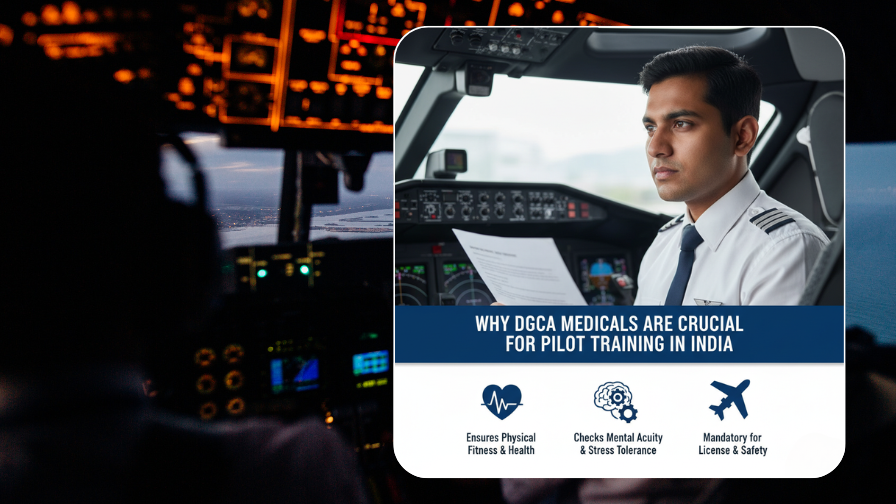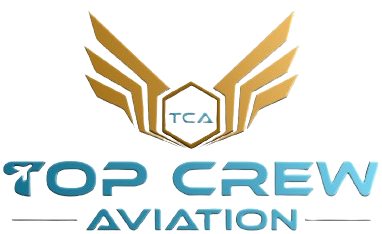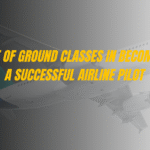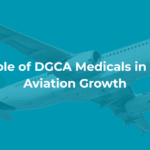
When aspiring aviators dream of flying, they often focus on flight hours, simulators, and aircraft handling. However, one of the most critical steps in a pilot’s journey begins before entering the cockpit—clearing the DGCA Medicals. Every leading Pilot Training Institute in India emphasizes the importance of passing these medical examinations because aviation is not just about skill; it’s also about health, safety, and fitness to fly.
In this blog, we’ll explore why DGCA Medicals are essential, how they impact pilot training, and why institutes like TOP Crew Aviation Academy guide students through the process step by step.
Understanding DGCA Medicals in Pilot Training
The Directorate General of Civil Aviation (DGCA) is India’s regulatory body for aviation. To ensure passenger and crew safety, it mandates strict medical fitness standards for all aspiring and licensed pilots.
There are two primary types of DGCA Medicals:
- Class II Medicals – Usually the first step for student pilots before enrolling in flying programs.
- Class I Medicals – Required before flying as a commercial pilot or before solo flights during training.
These medicals assess vision, hearing, cardiovascular health, mental stability, and overall fitness, ensuring that only healthy individuals can handle the demanding role of flying.
Why Are DGCA Medicals Crucial in Pilot Training Institutes in India?
1. Safety is Paramount in Aviation
No Pilot Training Institute in India can compromise on safety. DGCA Medicals act as the first filter to ensure that candidates are physically and mentally fit to take on the responsibility of flying an aircraft. A small health issue overlooked on the ground could become a serious risk in the air.
2. Foundation for a Pilot’s Career
Clearing DGCA Medicals early gives students confidence and clarity. Many aspirants invest lakhs in training, and failing medicals later could halt their career dreams. That’s why TOP Crew Aviation Academy always recommends candidates to clear their medicals first before committing financially to long-term pilot training.
3. International Standards Alignment
Aviation is global. DGCA medical standards are aligned with ICAO (International Civil Aviation Organization) norms, which ensures that Indian-trained pilots are recognized and respected worldwide. By enforcing strict medical standards, Pilot Training Institutes in India prepare candidates for global airline opportunities.
4. Stress and Mental Health Management
Flying is mentally demanding. Pilots must stay calm under pressure, handle emergencies, and make life-saving decisions. DGCA Medicals include psychological assessments to ensure candidates can withstand stress—something every reputable aviation institute emphasizes in training.
5. Long-Term Health Monitoring
DGCA Medicals are not a one-time clearance. Pilots must undergo periodic renewals to ensure continued fitness. This creates a habit of health monitoring, which benefits pilots in both their careers and personal lives.
Read Also – Issuance/Renewal of Flight Radio Telephone Operator’s (Restricted) License – (FRTOL-R)The Step-by-Step DGCA Medical Process in India
Aspirants at Pilot Training Institutes in India usually undergo the following steps:
- Class II Medical Examination Conducted by DGCA-approved doctors across India. It checks eyesight, blood tests, ECG, and general health.
- Getting Your File Number After Class II, students apply to DGCA for a file number, which becomes their official record in aviation.
- Class I Medical Examination Conducted at DGCA-approved medical centers like AFCME (Delhi), IAM (Bengaluru), or IAF centers. More detailed than Class II, including audiometry, treadmill tests, chest X-rays, and psychological evaluation.
- Issuance of Medical Assessment DGCA reviews reports and issues a final assessment, which is mandatory for joining flying training programs.
Challenges Faced by Students During DGCA Medicals
Many students face hurdles during this process:
- Unawareness of Approved Doctors – Some candidates approach non-DGCA doctors, leading to wasted time.
- Medical Conditions – Minor issues like eyesight correction, color blindness, or high BMI can delay the process.
- Long Waiting Periods – Class I medicals sometimes have waiting lists, especially at premier centers.
This is why TOP Crew Aviation Academy provides full guidance—from booking appointments to preparing students for tests.
How Pilot Training Institutes in India Guide Students Through DGCA Medicals
1. Pre-Medical Counseling
Reputed institutes like TOP Crew Aviation Academy conduct counseling sessions to help students understand medical requirements before applying.
2. Connecting With Approved Doctors
They provide verified lists of DGCA-approved doctors for Class II medicals across India.
3. Fitness Preparation
Institutes advise on lifestyle changes, like maintaining healthy weight, controlling BP, and avoiding vision issues, to improve chances of clearing medicals.
4. Follow-Up Assistance
Even if a candidate faces a temporary unfitness (often due to correctable conditions), academies assist in reapplication and clearance.
Why TOP Crew Aviation Academy Stands Out
Among all Pilot Training Institutes in India, TOP Crew Aviation Academy has built a strong reputation for guiding students at every stage of their journey. Their support in DGCA Medicals is a major advantage for aspirants who often feel lost in the complex paperwork and procedures.
By ensuring students clear medicals before starting training, they save time, money, and stress. This proactive approach makes them one of the most trusted aviation academies in India.
Common Misconceptions About DGCA Medicals
- “Wearing glasses disqualifies you.” – Not true. As long as eyesight is correctable within DGCA limits, candidates are fit.
- “Medical exams are just formalities.” – They are strict evaluations, not symbolic tests.
- “If failed once, you can’t reapply.” – Temporary unfitness can often be corrected, and students can reapply.
Clearing these myths is part of awareness that institutes must spread among aspiring pilots.
The Bigger Picture – Medicals and Pilot Careers
DGCA Medicals are not just a requirement; they are a lifelong commitment. From student pilot license (SPL) to commercial pilot license (CPL) and eventually airline transport pilot license (ATPL), medical fitness remains a constant checkpoint.
Without passing these tests, no amount of theoretical or practical flying knowledge will allow a pilot to progress. That’s why Pilot Training Institutes in India emphasize DGCA Medicals as the foundation of every aviation career.
Final Thoughts
Clearing DGCA Medicals is the first milestone in a pilot’s journey. They safeguard aviation safety, align with international norms, and ensure that only the most fit individuals become pilots.
For aspirants, the best approach is to clear medicals before enrolling in training. With expert guidance from institutes like TOP Crew Aviation Academy, students can navigate the process smoothly and focus on what they love most—flying.
In short, DGCA Medicals are not just crucial; they are the gateway to success in every Pilot Training Institute in India.
Frequently Asked Questions
Why are DGCA Medicals important for Pilot Training Institutes in India?
DGCA Medicals ensure that only physically and mentally fit candidates are allowed to train, maintaining aviation safety standards.
What is the difference between Class I and Class II DGCA Medicals?
Class II Medicals are required for student pilots starting training, while Class I Medicals are mandatory for commercial pilots.
Can I join Pilot Training Institutes in India before clearing DGCA Medicals?
It’s recommended to clear DGCA Medicals first. Top institutes like TOP Crew Aviation Academy guide students through the process.
Does wearing glasses disqualify me from passing DGCA Medicals?
No, as long as your eyesight is correctable within DGCA standards, you can still qualify for pilot training.
How often do pilots need to renew their DGCA Medicals?
Pilots must undergo periodic medical renewals—Class I usually every year, depending on age and license requirements.



